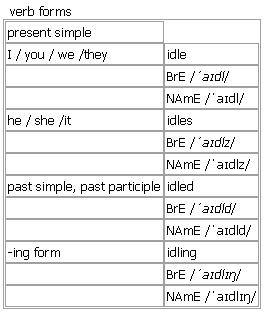 idle
idle

idle [idle idles idled idling] adjective, verb BrE [ˈaɪdl] NAmE [ˈaɪdl]
adjective
1. (of people)not working hard
Syn: ↑lazy
•an idle student
2. (of machines, factories, etc.)not in use
•to lie/stand/remain idle
3. (of people)without work
Syn: ↑unemployed
•Over ten per cent of the workforce is now idle.
4. usually before noun with no particular purpose or effect; useless
•idle chatter/curiosity
•It was just an idle threat (= not serious).
•It is idle to pretend that their marriage is a success.
5. usually before noun (of time)not spent doing work or sth particular
•In idle moments, he carved wooden figures.
see the devil makes work for idle hands at ↑devil
Word Origin:
Old English īdel ‘empty, useless’, of West Germanic origin; related to Dutch ijdel ‘vain, frivolous, useless’ and German eitel ‘bare, worthless’.
Example Bank:
•Half their machines are lying idle.
•He did not let the factory become idle.
•He never stayed idle for long.
•She never lifts a finger to help. She's bone idle.
•The land was left idle for years.
•The pumps are standing idle.
Derived Word: ↑idleness
verb
1. transitive, intransitive to spend time doing nothing important
•~ sth (+ adv./prep.) They idled the days away, talking and watching television.
•(+ adv./prep.) They idled along by the river (= walked slowly and with no particular purpose).
2. intransitive (of an engine)to run slowly while the vehicle is not moving
Syn: ↑tick over
•She left the car idling at the roadside.
3. transitive ~ sb/sth (NAmE)to close a factory, etc. or stop providing work for the workers, especially temporarily
•The strikes have idled nearly 4 000 workers.
Verb forms: 
Word Origin:
Old English īdel ‘empty, useless’, of West Germanic origin; related to Dutch ijdel ‘vain, frivolous, useless’ and German eitel ‘bare, worthless’.
|
|
